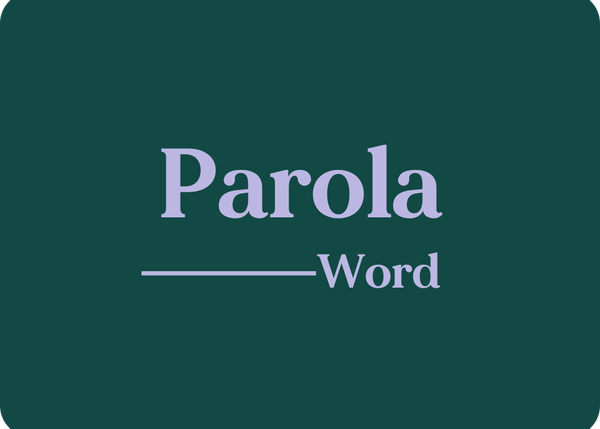Parola
NOUN [feminine]
Meaning and English translation 🔖
Word
🇬🇧 The smallest independent element of a language and communication, capable of conveying a meaning.
🇮🇹 L’elemento più piccolo e indipendente di una lingua e della comunicazione, capace di trasmettere un significato.
| Masculine ♂️ | Feminine ♀️ | |
|---|---|---|
| Singular | - | la - una parola |
| Plural | - | le - delle parole |
Example sentences 💬
Questa rubrica esplorerà una parola al giorno.
This newsletter will explore one word every day.
Ogni giorno ti chiederemo di scrivere una frase usando la parola del giorno.
Every day, we’ll ask you to write a sentence using the word of the day.
Iscriviti se ti interessa imparare tante nuove parole e curiosità.
Subscribe if you are interested in learning many new words and fun facts.
This article is brought to you by Giulia School, where you can learn Italian the natural way—with real conversations and passionate teachers guiding you every step of the journey. It’s the closest thing to immersion you can get without living in Italy. Click here to learn more.
Idioms with parola 🇮🇹
A buon intenditor, poche parole.
→ A word to the wise is enough
Ha capito subito cosa volevo dire, non ho dovuto spiegare oltre. A buon intenditor, poche parole.
He understood immediately what I meant, I didn’t need to explain further. A word to the wise is enough.
Dare la parola (1)
→ To promise; to give one’s word
Ti do la mia parola che non lo dirò a nessuno.
I give you my word I won’t tell anyone.
Dare la parola (2)
→ To give the floor
Il moderatore ha dato la parola al sindaco per il discorso di apertura.
The moderator gave the floor to the mayor for the opening speech.
Prendere la parola
→ To take the floor / to start speaking
Posso prendere la parola un momento?
May I say something for a moment?
Avere l'ultima parola
→ To have the last word
Nelle discussioni con lei, ha sempre l’ultima parola.
In arguments with her, she always has the last word.
Parole parole
→ Only lies
Continuano a parlare di cambiamento, ma la realtà è sempre la stessa. Parole, parole...
They keep talking about change, but reality stays the same. Words, words...
Culturale Note: This phrase comes from the famous Italian song "Parole parole" sung by Mina and Alberto Lupo. The song is a dialogue between a man and a woman where the woman dismisses the man's flattering words as just "parole" – mere words, emphasizing the emptiness of flattery and the disillusionment with insincere promises. It has become a popular expression in Italian to denote empty, insincere talk devoid of action or sincerity, and is often paired with the handgesture
Where does the word parola come from? 🔎
The word parola originates from the Latin "parabola," meaning "comparison" or "analogy." This highlights its early use in storytelling, emphasizing the importance of conveying complex ideas effectively through speech.





